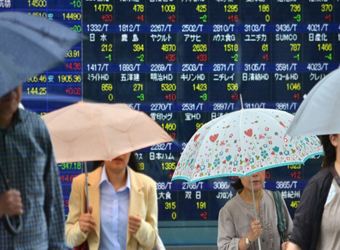Asian shares fell on Tuesday as investors turned to safe-haven assets and U.S. futures opened lower after a North Korean missile launch, although major indexes were off session lows in afternoon trade.
Japan’s Nikkei 225 dropped 0.59 percent, but retraced some of its initial losses after a North Korean missile flew over the country early on Tuesday. Japanese Prime Minister Shinzo Abe said in a statement that the launch was reckless and unprecedented.
Across the Korean strait, the Kospi lost 0.76 percent as investors processed the latest developments on the peninsula. The tech-heavy Kosdaq traded lower by 0.13 percent.
Stocks, including blue chips, across sectors sold off, but moderated steeper losses seen earlier in the day: Samsung Electronics was down 0.35 percent, LG Electronics shed 2.75 percent and Hyundai Motor declined 0.69 percent.
Meanwhile, defense stocks surged on the news, with Victek soaring 9.92 percent. The Korean won also fell almost 1 percent against the dollar earlier in the session.
Down Under, the S&P/ASX 200 declined 0.99 percent, with the financials and consumer discretionary sub-indexes leading losses.
The risk off sentiment also appeared to weigh on greater China markets. The Hang Seng Index fell 0.36 percent. Mainland markets were more subdued, with the Shanghai Composite erasing earlier losses to trade 0.06 percent above the flat line and the Shenzhen Composite trading lower by 0.136 percent.
Geopolitical tensions returned to the fore after North Korea launched a ballistic missile that flew over Japan on Tuesday. The missile headed in the direction of the Tohoku region before falling in the sea, Japan’s NHK said. The last time a projectile from the hermit state flew over Japan was 2009, according to Reuters.
“North Korea’s firing of more missiles, this time over Japan, could be the trigger for another round of global risk off,” warned ING Asia Head of Research Rob Carnell in a note.
Demand for traditional safe-haven assets rose following the latest provocation from North Korea, with demand for gold and the Japanese yen picking up in the aftermath of the launch.
Spot gold prices rose to their highest in almost 10 months on safe-haven demand early in the session. The yellow metal fetched as high as $1,322.33 an ounce before paring gains to last trade at $1,315.86, below the $1,317.10 seen on Monday.
Meanwhile, the Japanese currency strengthened to trade as high as 108.32 yen to the dollar — its strongest levels in about four months — compared with levels around the 108.8 handle seen overnight. The yen later gave up some of those gains to trade at 108.77 yen to the dollar at 12:33 p.m. HK/SIN.
The yen could have more scope to gain against the dollar, BK Asset Management Managing Director of FX Strategy Kathy Lien said in an early morning note. “If Trump responds with more than harsh words for North Korea, we could see dollar/yen drop as low as 108,” wrote Lien.
Meanwhile, Dow Jones industrial average futures opened more than 100 points lower following the North Korea missile news.
Global markets were shaken earlier this month after President Donald Trump cautioned that the North would be met with “fire and fury” if it continued to make threats against the U.S. North Korea responded by saying it was considering a strike on Guam, a U.S. territory, although it later somewhat backed down.
Elsewhere, energy markets continued to process the impact of Tropical Storm Harvey, a downgraded former hurricane. U.S. gasoline futures were up 1.45 percent at $1.7371 a gallon at 12:24 p.m. HK/SIN. Gasoline futures had settled up around 3 percent the previous session after refineries in the Houston area were shut down.
Also on the energy front, Brent crude futures rose 0.35 percent to trade at $52.07 a barrel and U.S. futures tacked on 0.47 percent to trade at $46.79. U.S. crude had settled more than 2 percent lower overnight on concerns that refinery closures would affect crude demand.
“What the Street is clearly pricing in as the effects of Hurricane Harvey’s flooding become apparent, is that the United States has plenty of crude oil, the difficulty will be refining it into usable products and then moving it to where it is needed,” said OANDA Senior Market Analyst Jeffrey Halley in a note.
Stateside, oil refinery stocks rose as investors digested the aftermath of Harvey, with the Dow Jones industrial average edging down 0.02 percent, or 5.27 points, to close at 21,808.4.
In currencies, the dollar index, which tracks the greenback against a basket of currencies, was mostly flat at 92.229 at 12:22 p.m. HK/SIN. The dollar slipped below the 93 handle last week following a central banking meeting at Jackson Hole.
In corporate news, Western Digital said it would foot about 150 billion yen ($1.37 billion) of an approximately 2 trillion yen bid for Toshiba’s memory unit, Nikkei Asian Review reported.
Western Digital is part of a consortium that also includes Innovation Network Corp of Japan. Toshiba shares were up 0.31 percent although other tech stocks traded lower due to overriding risk-off sentiment in the broader market.
Investors also kept an eye on earnings releases in Australia and Hong Kong, with companies such as Shanghai Fosun Pharma and Postal Savings Bank of China expected to report.
Source: CNBC


